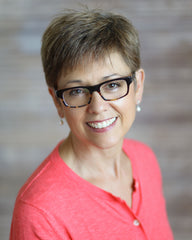 Lisa Pearl, MS, RD, LDN, CEDRD, CEDS, is a licensed clinical nutritionist and eating disorder specialist. She is the founder of CNC360 Counseling and Nutrition Center, as well as a clinician with over 30 years of experience in providing treatment, education, training and mentoring in the field. Lisa studied biology and nutrition at UMass in Amherst; her post graduate studies have included clinical nutrition at Boston University, expressive movement therapy at Lesley College, fellowships in adolescent medicine, nutrition support, and psychiatry at Harvard Medical School, and executive coaching at the Massachusetts School of Professional Psychology. Lisa consulted for MIT, Harvard University, Boston Ballet, and numerous independent and public schools for prevention, education, and treatment of eating disorders. She has written health curriculums and protocols for numerous public and private organizations and directed internships and provided mentoring for dietetic, social work, and medical students. She has served on the Board of Directors for Anorexia, Bulimia Care, Feeding Ourselves, and MEDA. Beyond her professional work, Lisa has done community organizing for City Year, Habitat for Humanity, and to address violence against women.
Lisa Pearl, MS, RD, LDN, CEDRD, CEDS, is a licensed clinical nutritionist and eating disorder specialist. She is the founder of CNC360 Counseling and Nutrition Center, as well as a clinician with over 30 years of experience in providing treatment, education, training and mentoring in the field. Lisa studied biology and nutrition at UMass in Amherst; her post graduate studies have included clinical nutrition at Boston University, expressive movement therapy at Lesley College, fellowships in adolescent medicine, nutrition support, and psychiatry at Harvard Medical School, and executive coaching at the Massachusetts School of Professional Psychology. Lisa consulted for MIT, Harvard University, Boston Ballet, and numerous independent and public schools for prevention, education, and treatment of eating disorders. She has written health curriculums and protocols for numerous public and private organizations and directed internships and provided mentoring for dietetic, social work, and medical students. She has served on the Board of Directors for Anorexia, Bulimia Care, Feeding Ourselves, and MEDA. Beyond her professional work, Lisa has done community organizing for City Year, Habitat for Humanity, and to address violence against women.
Dr. Barb: My guest today is Lisa Pearl, a licensed clinical nutritionist and eating disorder specialist for more than thirty years. She’s worked as a consultant on the prevention, education about, and treatment of eating disorders. She’s worked for a variety of organizations including MIT, Harvard University, and the Boston Ballet. We’re excited to hear from her and get her insights on eating disorders, which can develop at any time of life, including midlife. So, welcome, Lisa!
Lisa: Thank you, Barb, thank you so much. Thank you so much for having me, I’m actually really delighted to be here and so happy that Kira connected us because I’ve been listening to your podcast and am thoroughly enjoying it—it’s been really interesting. So thank you.
Dr. Barb: Well, thanks for taking your time to speak into this topic. Which, again, as we think about nutrition and eating disorders, I don’t think we think about the population that mostly I’m speaking to, but obviously it can impact both genders and any age group. But let’s go back and start out by talking a little bit about the field of nutrition and your interest in it and then what led you into the more specific area of treating eating disorders.
Lisa: Yeah, so I’m looking forward to talking to you about midlife and the incidence of eating disorders because that’s actually become quite a hot topic. But going back, and you know i do appreciate this question of what got you started and interested because every time I look back, it seems like my answer differs. It gets a little broader or deepens a little bit. The short and long of it, I think, is curiosity. I was just so curious about what makes us tick from the time probably in high school when I started reading and becoming interested in physiology and reading all of those psychology books that were out at that time like I’m Okay, You’re Okay and even diving into some Freudian stuff.
I was just curious about humans and wanted to learn more, so I ended up going to college for pre-med studies and ended up minoring in psychology and then last minute decided to add in nutrition and go to grad school for nutrition instead of going to medical school. That’s kind of another series of events that led me down that, but at the time there wasn’t really any holistic way of bringing together nutritional science and medical science and psychological theories and understanding and that’s what I was really craving.
So I went to grad school for nutrition and I ended up being in the mental health field because when I was an intern in dietetics, someone, I think it was my advisor, actually, asked if I would go do a consult on a man who had anorexia nervosa. So this is in what, 1981 of 1982, and I was fascinated by the consultation because I had had a little bit of personal experience because I’d been a gymnast in high school and so everyone did all kinds of weird things to make weight. Back then we’d be weighed in in order to compete.
So anyways, I remember going over to the library and diving into their archives and I came across this study done during World War II by this researcher Ancel Keys and it was called a starvation study and what he did was he had 30 conscientious objectors to World War II go on about a 1500 calorie diet and watch and see what happened. And what he discovered was that all of the diagnostic criteria, all the symptoms of having anorexia were actually coming through just through the physiological starvation. But remember at this time, you know, feminism and understanding of the female psychology really was just emerging and most people thought eating disorders were a failure to launch or an overreliance or dependency on mothers and not being able to separate them and it was a lot of mother bashing. And so, it was one of those moments of connection that I just love where you realize that, man, there’s a physiological component to this that’s being kind of not attended to. And of course there’s a psychological component, too, and that’s what I’ve been craving throughout my career—trying to understand the interconnection of that.
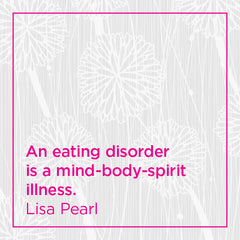 So I ended up doing this consult and it just so happened that in those rounds there was the director of psychiatry for Boston Children’s and so he asked me to re-do the rounds for Children’s Hospital, and I did that and that just kind of launched me into the field of eating disorders because at that time they had a whole unit of about 20 beds for people who have eating disorders. So I ended up doing some research on socio-cultural factors that contribute to eating disorders and really pulling in a lot more of the connections between what we understood in the field of psychology and psychiatry along with physiology and nutrition, so that’s my sweet spot: Understanding those relationships and being able to make the connections, that’s kind of what lights me up.
So I ended up doing this consult and it just so happened that in those rounds there was the director of psychiatry for Boston Children’s and so he asked me to re-do the rounds for Children’s Hospital, and I did that and that just kind of launched me into the field of eating disorders because at that time they had a whole unit of about 20 beds for people who have eating disorders. So I ended up doing some research on socio-cultural factors that contribute to eating disorders and really pulling in a lot more of the connections between what we understood in the field of psychology and psychiatry along with physiology and nutrition, so that’s my sweet spot: Understanding those relationships and being able to make the connections, that’s kind of what lights me up.
Dr. Barb: So today in 2020, you would say that the approach of understanding and treating these are a combination of both psychology and physiology.
Lisa: Oh, absolutely. It’s such a mind-body illness. And actually if you wanted to think about it in terms of just the definition it is a mind-body-spirit illness because there is such a depletion of that sense of connection and meaning and creativity within my clients. So it is an illness that I think deprives people of their vitality in every realm.
Dr. Barb: What’s the difference between an eating disorder and disordered eating?
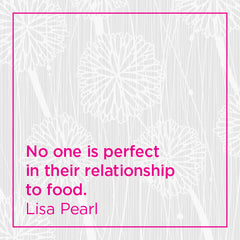 Lisa: That’s a good question. So, eating disorders are a medical diagnosis that’s qualified and quantified in the DSM-V, and disordered eating is someone who is kind of moving away from the norm, no longer really listening to their internal appetite cues, not eating for lot of other reasons like rules or rigidity, body shaping or changing; they’re ignoring their own internal compass about how to take care of themselves with food. Their relationship with themselves and their relationship with food is not really as close and in sync as it normally would be. Somebody who has disordered eating might be skipping meals, they might be dieting, they might be eating when they’re not hungry or overeating when they’re full. You know, lots of examples of disordered eating are really a part of what happens to us just as human beings. No one is perfect in their relationship to food. But I think disordered eating can very much be along that continuum where someone moves into an eating disorder and yet it doesn’t have to be that, I mean, in that if you have somebody who’s starting to develop really a lot of negative body image or concerns about their body and getting into some disordered eating where they have more and more separation from their own internal regulation, that’s a great time for those people to get in to see a dietician that specializes in eating disorders or a therapist that specializes because it’s so easy to turn things around at that point. When it progresses into a diagnosed eating disorder it becomes more difficult.
Lisa: That’s a good question. So, eating disorders are a medical diagnosis that’s qualified and quantified in the DSM-V, and disordered eating is someone who is kind of moving away from the norm, no longer really listening to their internal appetite cues, not eating for lot of other reasons like rules or rigidity, body shaping or changing; they’re ignoring their own internal compass about how to take care of themselves with food. Their relationship with themselves and their relationship with food is not really as close and in sync as it normally would be. Somebody who has disordered eating might be skipping meals, they might be dieting, they might be eating when they’re not hungry or overeating when they’re full. You know, lots of examples of disordered eating are really a part of what happens to us just as human beings. No one is perfect in their relationship to food. But I think disordered eating can very much be along that continuum where someone moves into an eating disorder and yet it doesn’t have to be that, I mean, in that if you have somebody who’s starting to develop really a lot of negative body image or concerns about their body and getting into some disordered eating where they have more and more separation from their own internal regulation, that’s a great time for those people to get in to see a dietician that specializes in eating disorders or a therapist that specializes because it’s so easy to turn things around at that point. When it progresses into a diagnosed eating disorder it becomes more difficult.
Dr. Barb: So as a practitioner what are the cues to know that they may be on a path towards an eating disorder? Is it primarily weight related or is it the patients sharing their eating pattern? What would be the early signs to say that this needs intervention to see a nutritionist?
Lisa: You know there are some interesting screening tools out there for physicians to be able to ask and particularly to ask people in midlife and beyond because they are not questions that are normally asked, and yet people of all ages, genders, cultures, races, ethnicities have and struggle with eating disorders. You know, just some really simple questions like, “Are you struggling at all with managing your weight or appetite?” or “Are you uncomfortable in your body in any way?” or even “How do you feel about your body? How is your body image?” “Do you spend a lot of time thinking about eating or food or your weight?” So trying to get some idea of how their preoccupation with food or weight might be interfering in their life. So, in the DSM, in the diagnostics manual, weight and amenorrhea have actually been taken off the criteria for anorexia because you can have people who are in what look like normal size or average-sized bodies and really struggling with a preoccupation with how much they eat and a lot of obsession or rigidity around how they take care of themselves with food that really is interfering with their capacity to enjoy life.
Dr. Barb: So it’s not just about weight.
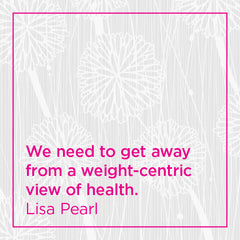
Lisa: Right. Exactly. And you know, people who work in the field with me are really trying very hard to help people recognize that we need to get away from a weight-centric view of health because it’s very misleading. You can have people of all body sizes who are taking care of themselves or not taking care of themselves, right? It’s really about the behavior and about what they’re doing to keep themselves healthy.
Dr. Barb: Interesting. Yes, that will be a really big challenge for the health community to do that, but I hope that that is an effort that can be accomplished because I do think… You know, our computer—we have weight and BMI and it needs to be recorded and we’re supposed to give a diagnosis associated to the BMI, categorizing their BMI, so I think we’ve got a long way to go.
Lisa: Oh, absolutely, I’m so glad you said that. And I don’t know, you probably have come across various articles that are promoting health at every size and the whole notion of moving away from this weight-centric paradigm that health is determined by body weight is incredibly important not only for those people living in larger bodies who are really healthy but all of the shame and the stigma that they experience because they do live in larger bodies. So it’s a very important component not only of what we need to do try to have a more diverse treatment of all people and that respect for diversity, but it’s also a really important part of preventing what can be absolutely devastating for individuals if they develop an eating disorder.
Dr. Barb: So let’s talk a little more specifically right now about midlife women and the incidence or occurrence of eating disorders and your understanding of why that might be an at-risk time.
Lisa: Yeah, so this is so sad—I feel like podcasts like yours are opening the eyes of many people, especially clinicians, about how much we need to talk more about midlife and beyond, right? Over the last decade or so it’s been apparent that there’s been this increase in admissions to treatment facilities for eating disorders of women who are over the age of 45. And so most recently 25 percent of all admissions to eating disorder treatment centers have been with women over 45. And about 35 percent of patients in partial or outpatient treatment programs are over 45. So it’s a significant number of people, and some terrific researchers in the field I think last year tried to look at, you know, what are the differentiations for people in this group: are they just getting eating disorders at this point in time, or is it something that’s been happening for awhile?
And what they discovered is that there are folks who have suffered their whole life and they’re just now coming forward for treatment. There are some women who had a subclinical eating disorder back when they were younger and then they went into some sort of partial or even full remission and then they had a recurrence or a relapse of the eating disorder when they went into midlife. There are some people who have had subclinical eating disorders their entire life and then when they get into midlife then it really kind of blossoms and becomes a diagnostic sort of relevantly diagnostic for an eating disorder. And then the smallest portion of these folks is actually the number of women who have that initial onset in mid or later life of an eating disorder.
So—sorry, don’t know if you can hear the train going by my office—it is really curious, though, because when we first started to recognize this is happening for women in midlife, it was a no brainer that we have to start thinking of these points of transition where we have this uptick in incidence of eating disorders in young adolescent girls, mostly, and then we have this other big point of transition during menopausal years there’s another big surge in incidence. So you have to start wondering about the commonalities. You know, certainly hormones are changing, there’s a lot of identity issues and mental issues that happen around that point in time and is also the cultural piece, right, the double standards that exist in early adolescence and then also in midlife between the genders where boys are encouraged to grow during adolescence and become big, strong men, and girls are often discouraged from growth, right, discouraged from attending to their natural growth trajectory. And then, you know, for older men they tend to have this distinguished role in our culture. You see a lot of older men represented in the media and then older women are more sparsely represented. There seems to be this cultural idea or influence that our meaning and our beauty is diminishing with age.
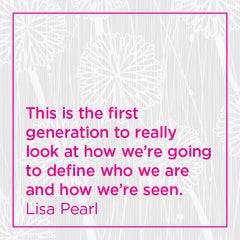 And I think a lot of women feel very sidelined around that age. There was a woman on your podcast, Jane Evans, I think, who was this hot potato, and she was talking a lot about how women in midlife have to struggle with this invisibility or this sense of irrelevance. And she made this point that we’re living 20 years longer than our grandmothers, so we’re in this really unique place where we have this middle expanse of time that we can begin to really evaluate how we’re going to be seen. This is the first generation to really look at how we’re going to define who we are and how we’re seen. So I’m really hoping that podcasts like this are going to make a difference and that more and more women midlife and beyond have a voice. But, just kind of going back—I know I’m all over the place, I’m excited to be here—there are these points of transition in adolescence and in midlife where I think there’s this inherent conflict in women and not just women, I think it’s throughout LGBTQ+ community as well, and really spans the age spectrum, but truly at those points I think there’s encouragement to disconnect from ourselves and our own wisdom and follow our own innate path and we get a little more vulnerable to what other people and other influences in our culture about who we should be. And I think that’s kind of the beginning of losing our way.
And I think a lot of women feel very sidelined around that age. There was a woman on your podcast, Jane Evans, I think, who was this hot potato, and she was talking a lot about how women in midlife have to struggle with this invisibility or this sense of irrelevance. And she made this point that we’re living 20 years longer than our grandmothers, so we’re in this really unique place where we have this middle expanse of time that we can begin to really evaluate how we’re going to be seen. This is the first generation to really look at how we’re going to define who we are and how we’re seen. So I’m really hoping that podcasts like this are going to make a difference and that more and more women midlife and beyond have a voice. But, just kind of going back—I know I’m all over the place, I’m excited to be here—there are these points of transition in adolescence and in midlife where I think there’s this inherent conflict in women and not just women, I think it’s throughout LGBTQ+ community as well, and really spans the age spectrum, but truly at those points I think there’s encouragement to disconnect from ourselves and our own wisdom and follow our own innate path and we get a little more vulnerable to what other people and other influences in our culture about who we should be. And I think that’s kind of the beginning of losing our way.
Dr. Barb: You know, I’m just nodding to everything you said because as I think about seeing women in consultation for perimenopause and menopause we certainly talk about other things, for instance many women talk about the inability—I can’t concentrate, I can’t focus, I think I have ADD. We don’t necessarily think that ADD is a new diagnosis for 45 or 50 year old, but it was maybe subclinical, and now the other factors that go into play for women are happening, whether it’s sleep disruption or anxiety or whatever it might be, it manifests itself. So it makes perfect sense to me that women who have never been identified as having any clinical-related eating issues that it might manifest at this time. I think that makes perfect sense and I’ve never really heard it explain that way, but I can relate to that in hearing what my patients are experiencing. I’m wondering about the physiology or the pathophysiology outside of the disruption women may have in sleep and mood and some of that but is there some understanding of actual metabolic impact that may add risk for women at this stage?
Lisa: Yeah, that’s a great question. I wish we knew more about that. There are a couple things during that perimenopausal period. I think there’s a natural tendency for women to begin some weight gain, and certainly with the estrogen levels starting to drop, they’re going to have more male patterning of adipose tissue around the abdomen, the more center of gravity around the abdomen. We know from some longitudinal studies that women who gain weight around perimenopause tend to have a lower morbidity rate and improved mortality rates and they tend to maintain better bone density. But that’s not something that’s really promoted as positive around perimenopause I think there is much more suggestion in the culture that women need to control that and fight back to maintain their youthful appearance and shape and so again, fighting against the body’s physiology and natural tendencies and in the end, and in order to do that, they have to disconnect from their own cues and they may not eat when they’re hungry, they may not eat to the point of satisfaction.
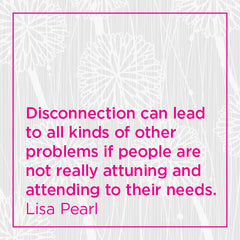 And all of that kind of cycles way down into that deep place of feeling like you can’t trust your own self. And there’s this ongoing experience of you can’t really trust who you are or there’s something wrong with your own internal communication. And that distrust, that separation, that disconnection can lead to all kinds of other problems if people are not really attuning and attending to their needs not just in appetite but also in terms of their emotional needs and emotional expression and maybe sexual needs, you know, all of the things that lead to that shame of feeling like you’re not good enough or something is wrong then comes out in your office where people aren’t talking to you about all of the things that are really bothering them at this point in time. So, you know, from a physiological perspective, the changing hormones I think make a big difference, and I don’t know about metabolism. I think there’s a lot more work to be done there. I think that it’s the shifting of the hormones that are probably going to contribute to the way in which the body is managing the metabolism and digestion and utilization of food.
And all of that kind of cycles way down into that deep place of feeling like you can’t trust your own self. And there’s this ongoing experience of you can’t really trust who you are or there’s something wrong with your own internal communication. And that distrust, that separation, that disconnection can lead to all kinds of other problems if people are not really attuning and attending to their needs not just in appetite but also in terms of their emotional needs and emotional expression and maybe sexual needs, you know, all of the things that lead to that shame of feeling like you’re not good enough or something is wrong then comes out in your office where people aren’t talking to you about all of the things that are really bothering them at this point in time. So, you know, from a physiological perspective, the changing hormones I think make a big difference, and I don’t know about metabolism. I think there’s a lot more work to be done there. I think that it’s the shifting of the hormones that are probably going to contribute to the way in which the body is managing the metabolism and digestion and utilization of food.
Dr. Barb: So, for listeners, what can you say to them practically about what might indicate an unhealthy relationship with food?
Lisa: Well, I think the first thing is when it interferes with what you want in your life, you know, what values you have in your life, what has meaning in your life. If going out with your children for dinner is meaningful, and you value those relationships, but you limit when you go because you don’t want to be exposed to the food or you’re afraid that you’ll overeat. Or if a bunch of friends are getting together for pizza and you feel like you have to stand on the outside of that because you won’t give yourself permission to eat the pizza. That you can’t enjoy the normal social interaction around meals and food that you value. Or if your thoughts are becoming preoccupied around food and body. And so much of your life is being narrowed into that focus, that myopic view of your life is now about what you’re eating and how you’re eating nad what kinds of foods and what amounts and how much you’re exercising and you’re not really living, maybe, the full life that you would like or that the life that you have is really muted by the preoccupation of food and body.
Dr. Barb: Yeah, I think that’s well said and I think those are very helpful practical examples of what might alert women to having a disrupted or an unhealthy relationship with food. And for those who maybe are able to identify themselves as moving in that direction or having some issues related to that, and again, I’m asking this really as a practitioner, is the next best step seeing a nutritionist, seeing a therapist, incorporating both? Do you have any recommendations as to how to best move women back towards healthy eating and a healthy relationship with food?
Lisa: I hope I do. Yes absolutely. So pretty much a dietician or nutritionist who specializes in eating disorders and we do have a set of degrees that have credentials like a certified eating disorder RD or registered dietician, and then there are certainly many psychotherapists who also specialize in eating disorders. I think it’s important to find someone who understands all the different aspects of an eating disorder. And if you go to a psychotherapist, most likely they’re going to refer you to a dietician to work with as well and vice versa. So we almost always work in teams because there’s so much richness in that collaborative effort between the psychotherapist and the dietician. And that’s where people get a lot of the benefit of really regaining a trusting and self regulating relationship with food and body.
Dr. Barb: So, do you see any changes in societal expectations for women, both young women, midlife women, do you have any reason to have optimism that we might be moving in a healthier direction or the expectations on the messages that women are getting and incorporating into their lives?
Lisa: Yes, I do.
Dr. Barb: Good! I’m glad to hear that.
Lisa: Again, I’m so psyched to be on this podcast and to be listening to your episodes. So [Dr. Bluming and Carol Tavis] did something on your podcast that they did in their book Estrogen Matters and he, Dr. Bluming said, I think you quoted him, “It can be daunting to either expose or express a minority opinion in medicine.” Do you remember that quote?
Dr. Barb: Yes.
Lisa: And honestly I resonated with that so much because I have been espousing this idea of health at every size and intuitive eating for a very, very long time. And I’ve been talking about why diets are dangerous and how weight cycling is even worse for the body and I’ve been beating that drum for a long time.
So here’s the hopefulness: We have this incredible upswing of people in the field, both in the mental health field as well as in the nutrition field, who are taking this on and researching the bejesus out of it and just really going out there and helping people realign their relationship with food and body in a way that will keep them healthy for the rest of their lives, hopefully, but to decrease that struggle and to help them begin to mediate or mitigate the influence of the media and all of the weight bias and stigma that is out there to help get them a little more fluency around how to take care of their bodies without falling into the traps of dieting and orthorexia and things like that. How to understand mindfulness in their lives and use it for movement and for relationships and for emotional experiences.
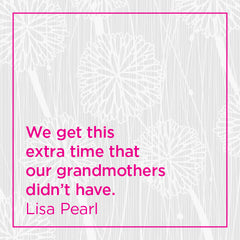 So absolutely, there’s an incredible, I think, second wave of people coming into the field and working in this paradigm. So I’m delighted, and going back to what Jane Evans was saying, we have this incredible capacity to have this cross-generational networking, right, we get this extra time that our grandmothers didn’t have, and so now we get to just support all these young clinicians and encourage them and mentor them, and we get to also look at the generation ahead of us and everything that they have done, all of the ways in which they’ve made our professions possible.
So absolutely, there’s an incredible, I think, second wave of people coming into the field and working in this paradigm. So I’m delighted, and going back to what Jane Evans was saying, we have this incredible capacity to have this cross-generational networking, right, we get this extra time that our grandmothers didn’t have, and so now we get to just support all these young clinicians and encourage them and mentor them, and we get to also look at the generation ahead of us and everything that they have done, all of the ways in which they’ve made our professions possible.
Dr. Barb: Yes, it is an exciting time. And I’m just really grateful for your work and your eloquence in speaking into this topic. And I’d like to conclude our time together with a question of where do you find fullness in your life at this time?
Lisa: That’s a great question. I guess, you know, kind of what I was saying before: Being in this space where we can look back and we can have that capacity for reflection and review of the first half of our life and we can also look forward but we don’t have the worry and the angst about creating our future as much, you know, with that first half of your life where you’re so earnest about building your career or meaning in your life. At this point I feel like I can soften that a little bit more and I can be in that sweet spot again of looking back and finding the connections from my younger years or from younger generations and helping to put that into a perspective that looks towards the future. And that feels pretty good.
Dr. Barb: Yeah, beautifully said. Taking all the wisdom you’ve acquired over so many years of your profession and in your life and I think from what we’ve learned from our patients, don’t you agree, that that’s really helped create…
Lisa: Oh my gosh, so much. You know, we could talk forever about our deepening understanding of body image or treatment or all the different changes that have happened over the decades that I’ve seen and we obviously have a long way to go, but we have come a long way.
Dr. Barb: Gratefully. Well, thank you for your time today, Lisa, I really appreciate it.
Lisa: It’s a pleasure. Thank you.
 Dr. Barb DePree, M.D., has been a gynecologist and women’s health provider for almost 30 years and a menopause care specialist for the past ten.
Dr. Barb DePree, M.D., has been a gynecologist and women’s health provider for almost 30 years and a menopause care specialist for the past ten.


0 comments